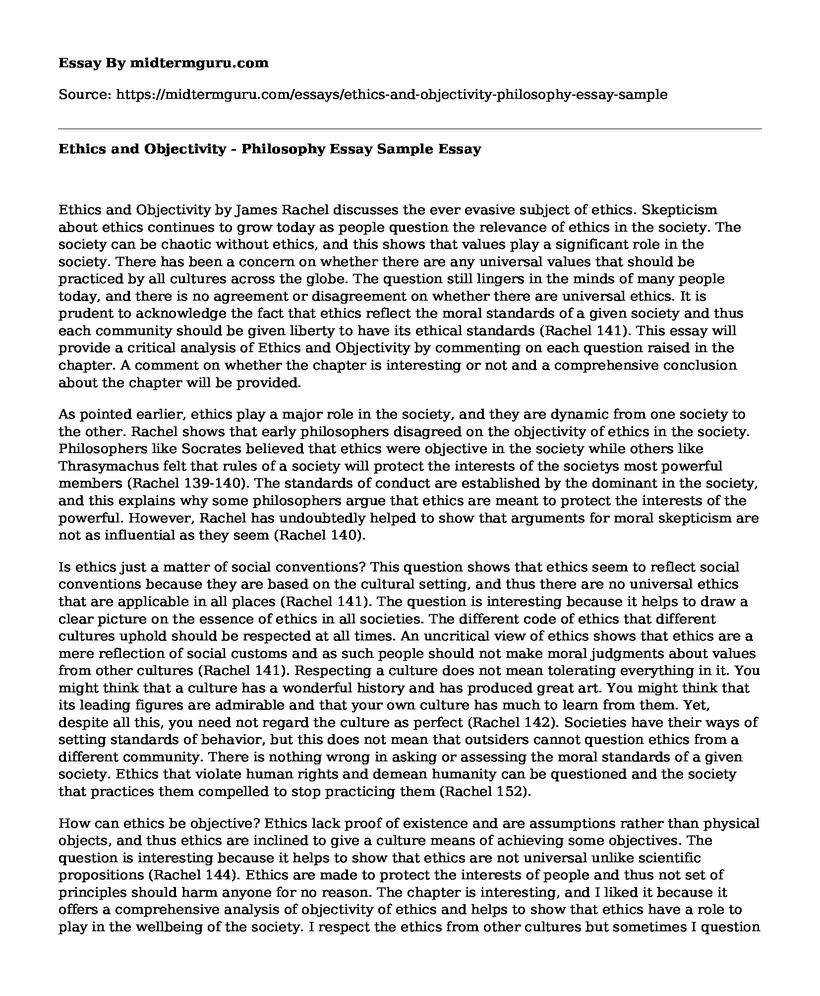Ethics and Objectivity by James Rachel discusses the ever evasive subject of ethics. Skepticism about ethics continues to grow today as people question the relevance of ethics in the society. The society can be chaotic without ethics, and this shows that values play a significant role in the society. There has been a concern on whether there are any universal values that should be practiced by all cultures across the globe. The question still lingers in the minds of many people today, and there is no agreement or disagreement on whether there are universal ethics. It is prudent to acknowledge the fact that ethics reflect the moral standards of a given society and thus each community should be given liberty to have its ethical standards (Rachel 141). This essay will provide a critical analysis of Ethics and Objectivity by commenting on each question raised in the chapter. A comment on whether the chapter is interesting or not and a comprehensive conclusion about the chapter will be provided.
As pointed earlier, ethics play a major role in the society, and they are dynamic from one society to the other. Rachel shows that early philosophers disagreed on the objectivity of ethics in the society. Philosophers like Socrates believed that ethics were objective in the society while others like Thrasymachus felt that rules of a society will protect the interests of the societys most powerful members (Rachel 139-140). The standards of conduct are established by the dominant in the society, and this explains why some philosophers argue that ethics are meant to protect the interests of the powerful. However, Rachel has undoubtedly helped to show that arguments for moral skepticism are not as influential as they seem (Rachel 140).
Is ethics just a matter of social conventions? This question shows that ethics seem to reflect social conventions because they are based on the cultural setting, and thus there are no universal ethics that are applicable in all places (Rachel 141). The question is interesting because it helps to draw a clear picture on the essence of ethics in all societies. The different code of ethics that different cultures uphold should be respected at all times. An uncritical view of ethics shows that ethics are a mere reflection of social customs and as such people should not make moral judgments about values from other cultures (Rachel 141). Respecting a culture does not mean tolerating everything in it. You might think that a culture has a wonderful history and has produced great art. You might think that its leading figures are admirable and that your own culture has much to learn from them. Yet, despite all this, you need not regard the culture as perfect (Rachel 142). Societies have their ways of setting standards of behavior, but this does not mean that outsiders cannot question ethics from a different community. There is nothing wrong in asking or assessing the moral standards of a given society. Ethics that violate human rights and demean humanity can be questioned and the society that practices them compelled to stop practicing them (Rachel 152).
How can ethics be objective? Ethics lack proof of existence and are assumptions rather than physical objects, and thus ethics are inclined to give a culture means of achieving some objectives. The question is interesting because it helps to show that ethics are not universal unlike scientific propositions (Rachel 144). Ethics are made to protect the interests of people and thus not set of principles should harm anyone for no reason. The chapter is interesting, and I liked it because it offers a comprehensive analysis of objectivity of ethics and helps to show that ethics have a role to play in the wellbeing of the society. I respect the ethics from other cultures but sometimes I question standards that I feel lower human dignity. I always feel that every society should be given freedom to uphold its own choice of ethics as long as it the ethics do not violate the ethics of other societies. Ethics from different cultures have the same mandate of promoting the welfare of the society that upholds. I always uphold the ethics of my culture and I think that ethics are not solely meant to serve the powerful in the society.
The chapter offers a critical in-depth analysis of ethics and objectivity. It is clear that ethics somehow lack objectivity, but this does not mean that ethics are irrelevant in the society. Despite the fact that ethics lack physical proof of existence, they are part and parcel of the society. The ethics from diverse cultures should be respected but can be questioned wherever they violate whatever all people across the world agree is right. Ethics lack physical proof that they exist, but they do exist and reflect the social norms of a given society. The codes of ethics vary from one society to the other, and no society should impose its ethics on other society. However, respecting the unique values of culture does not empower any society to come up with social norms that violate human rights such as authorizing rape and other dehumanizing acts. Ethics should not cause any harm to the people and as such societies that have to uphold some standards that cause harm to some people should be questioned.
Cite this page
Ethics and Objectivity - Philosophy Essay Sample. (2021, Jun 08). Retrieved from https://midtermguru.com/essays/ethics-and-objectivity-philosophy-essay-sample
If you are the original author of this essay and no longer wish to have it published on the midtermguru.com website, please click below to request its removal:
- Apology of Socrates by Plato
- Essay on John Winthrops Puritan and Waldo Emerson Transcendentalism
- Ethical and Sociocultural Considerations in Psychological Testing Essay
- Paper Example on Media Ethics Theory
- Essay Sample on Ethical Reasoning: Kant Versus Stuart Mill
- Code of Ethics: A Foundation for Professionalism - Essay Sample
- The Rise of Unethical Behaviors: Practical Ethics and Ethical Ramifications - Essay Sample







